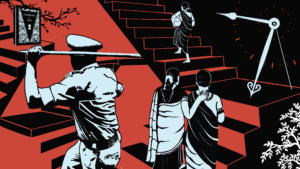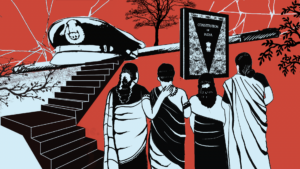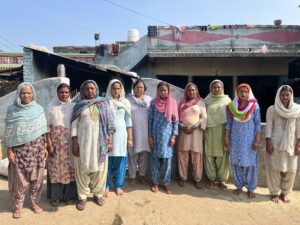How Systemic Injustice Is Driving Pardhi Women To Extreme Despair, Suicide
In Pardhi bastis, suicide is so common that it is normalised by the community. Constant encounters with institutional violence, bias and poverty leave women with little hope for a better future
- Priyanka Tupe
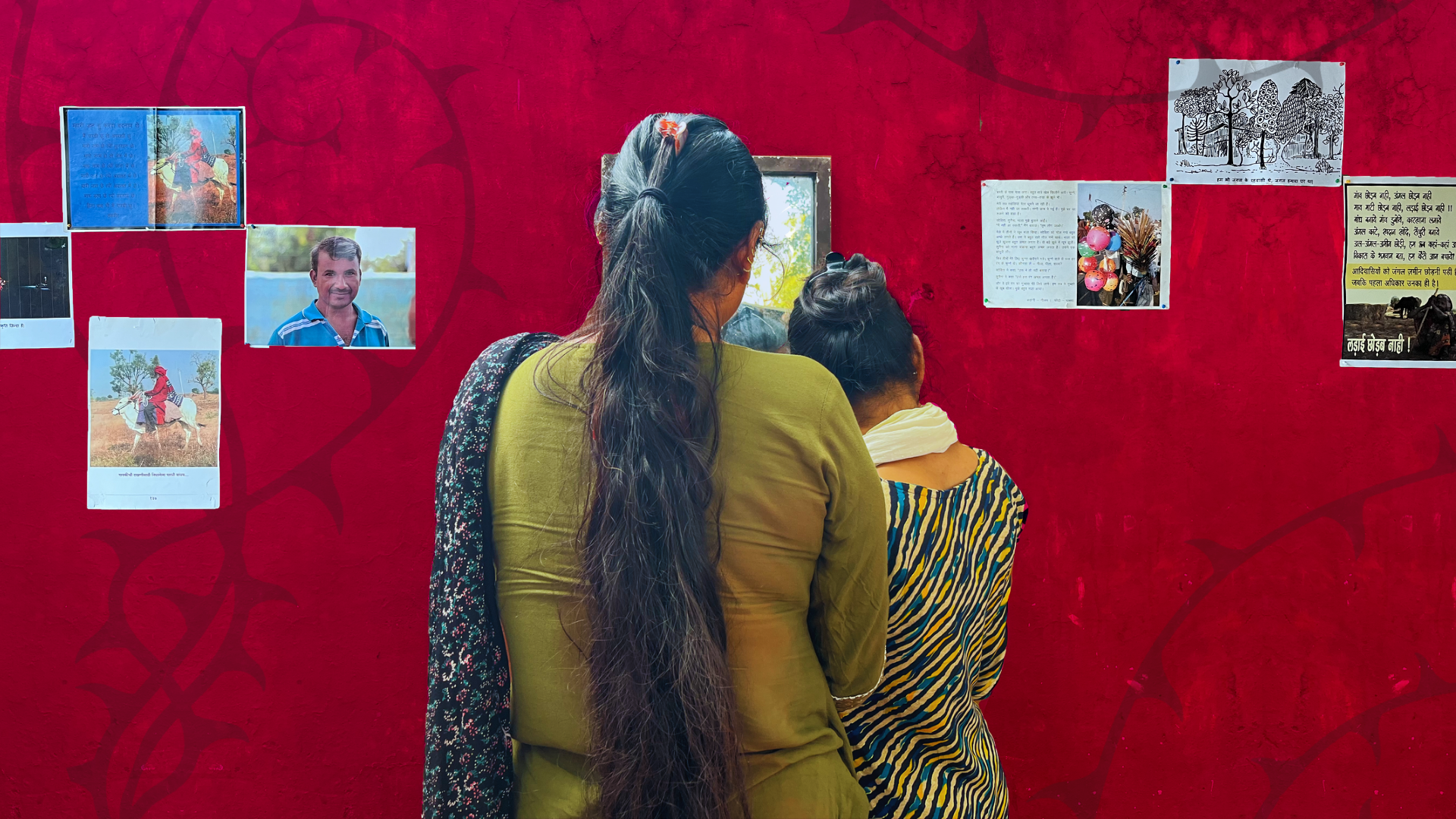
Trigger warning: Mention of suicide, gender based violence
Though it is a pleasant January afternoon, there is a dull, grey pall all over Rajiv Nagar basti, about 15 km from Bhopal city. Small, densely packed houses stand in quiet sorrow in this settlement of Pardhis, a group classified as the highly marginalised NT-DNT community.
The melancholy comes from an alarming fact – anecdotal evidence collected by Pardhi activists and Muskan, a Bhopal-based non profit, show that almost every household here has had to witness a death by suicide. Most of these deaths are among women.
These facts emerged from a focus group discussion held by Behanbox with eight Pardhi women in the Karond settlement of Bhopal. The conversations, facilitated by Muskan, are being kept anonymous.
“Mere ghar ke hi 15 se jyada log kahtam ho gaye pichale kuch salo me phasi laga kar. Mere nani ke parivar me toh lagbhag saare log khatam ho gaye. Sab aas pass hi rahte the. Har saal kisi na kisi ka suicide ho raha hai family me (over 15 members of my extended family have died by suicide in last few years, hanging themselves to death. I have lost many relatives in my maternal family. All of them lived in this settlement. Every year there is atleast one case of suicide in my family),” said Joteshwari Pawar, 22 who studied up to Class 10.
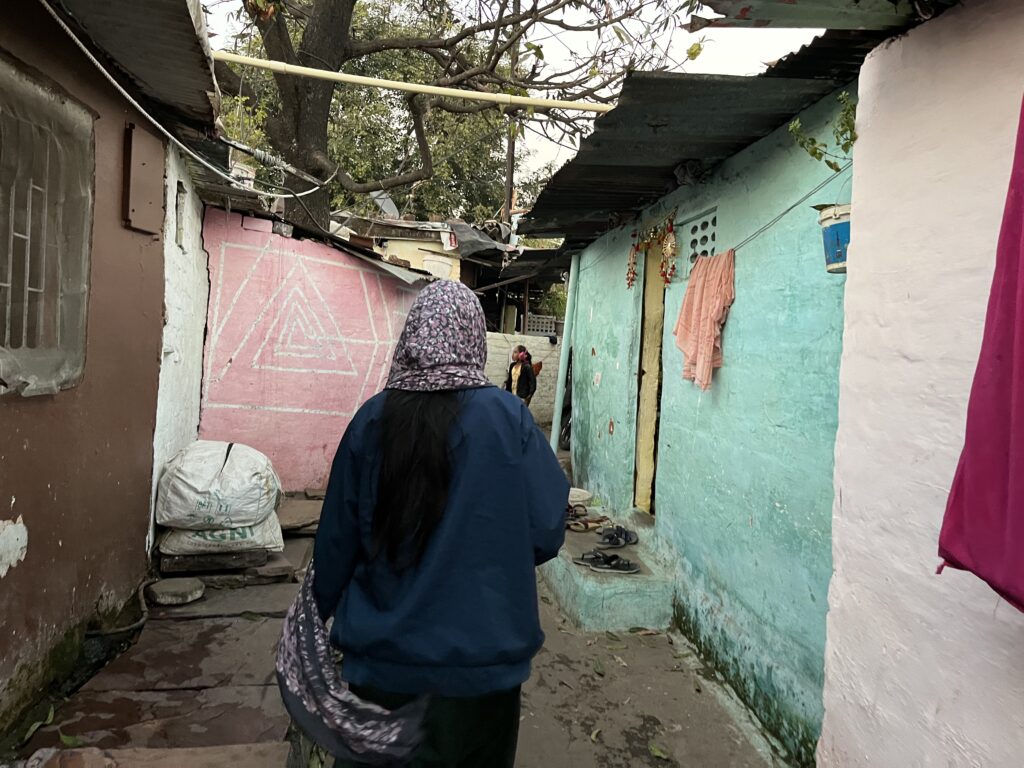
The reasons, she said, are several —poverty, unemployment and relentless police harassment. “We are criminalised because we are Pardhi. Even schoolchildren are manhandled, verbally abused and beaten by the police and they end up taking their own lives,” she alleged.
Children are often detained by the police when they go waste picking or even when they are simply out on the streets. “We have seen multiple such cases and how mothers struggle to meet the bribe demands of the police to free their children. Our intervention with rights based awareness among the community and with support groups like Azad Jugnu is now creating some change, that community now resists violence by registering complaints against concerned police officers, participating in protests and demonstrations. But police brutality towards children persists and we are trying to sensitise the police about this,” said Savita Sohit, an activist working with Muskan.
A survey conducted with 189 Pardhi people in 2016, revealed that 25 out of 189 people died by suicides because of institutional violence. Kranti, an organisation that works with NT, DNT community in Pune’s Shirur taluka in Maharashtra, recently conducted a similar survey on suicides. “We found 40 deaths by suicides among Pardhi people from six Shirur villages in last five years. Our survey will be available soon in the public domain,” said Sunita Bhosale, a Pardhi activist who heads Kranti.
Though the NT-DNT community shed its colonial tag as a “criminalised” community 150 years ago, its members are still treated with suspicion, especially by the police. Most Pardhis live off daily wages made from waste picking and they often migrate in search of livelihood. Women of the community survive by collecting waste and selling scrap and in the course of their work they are often accused of theft, beaten up, verbally abused, and arrested and sometimes sexually abused by the police, we learnt in interviews.
Grassroots employment schemes like MNREGS have not reached them because of exclusionary practices and structural issues, Behanbox has reported.
Poverty, Debt, Suicides
Tasveer Parmar, a lawyer and a well-known social activist from the Pardhi community in Bhopal, shares a story with us of a 14-year-old boy from his family died who died by suicide because he could not deal with the constant hunger.
“This happened about three or four years ago,” he recalled. “That day, the mid-day meal was not served at his school for some reason. Hungry, he came home and asked for Rs 20 to buy some food. But there was no money in the house. A while later, the boy hanged himself. But such tragedies are common in Pardhi families. It’s not just about one day of hunger but about going to bed hungry often, not earning enough despite working hard, and having no social dignity. It makes even children hopeless and exhausted with life.”
In the Karond settlement of Bhopal, Pardhi women echoed similar experiences. “Our women go out to collect scrap. If they don’t find enough scrap or if the police catch them and demand bribes, they come home and hang themselves. If they don’t earn enough, how will they feed their children? That question torments them,” said Kareena Parmar, a young activist from the community and a waste picker herself.
The other waste-picker women present at the meeting—Khushi, Neha, Binda and Sanish—also shared that they had lost female relatives and friends in the community to suicides.
“Women also face domestic violence when they come home from work. A lot of times they have to give their hard earned money to their husbands for alcohol and other substances. Quarrels, verbal abuse, and beating is everyday life for us. How much can a woman bear? Many times death seems an escaping option,” said Sanish, a young Pardhi activist from Karond Basti in Bhopal.
Pardhi women do not go to the police stations to seek relief from domestic violence, because of the institutional bias against the community.
“Police sunti hai kabhi hamari? Koi nahi sunta, koi bhi sarkari office me ijjat nahi milti, koi vishwas hi nahi karta. Ulta hamesha police ka dar hota hai (the police don’t listen to us, no official ever respects us; in fact, we fear the police),” said Khushi, a Pardhi waste picker from Karond Basti.
Access to justice in any gender-based violence cases is almost non-existent for Pardhi and other NT DNT women, Behanbox has been constantly reported, here here and here.
In India, 1,70,924 people died by suicide, according to the latest report of National Crime Records Beuro (NCRB), Accidental deaths and Suicides in India (ADSI) – 2022. Of them 1,09,904 (64.3 %) were earning under Rs 1 lakh annually. Among them, 45,194 were daily wage workers and 5371 of these deaths were recorded in Madhya Pradesh.
The suicide rate in Madhya Pradesh is 17.9 per 1,00,000 population, higher than the all India average rate of 12.4, according to the recent ADSI report. This ranks the state at number three in annual suicide numbers.
India has recorded higher number of suicide deaths of young people (15 to 29 years). This number is higher than deaths by road accidents and maternal mortality, according to India’s National Suicide Prevention Strategy document. One in three women and one in four men dying by suicide in the world is from India.
However NCRB data does not classify deaths by suicide of women who are victims of domestic violence. It does have a vague category, ‘family problems’, and in it a sub category, ‘dowry related’ issues.
Cycle of Debt And Violence
Pardhi women who died by suicide in Bhopal were also trapped in relentless debt cycles, we were told in interviews. Most of these debts were in the range from Rs. 30,000 to Rs. 3,00,000 and were mainly taken for bribing the police to be rid of allegedly fabricated cases of theft, robbery and so on.
“We take loans from private money lenders, mostly a handful of powerful men from our caste. We are illiterate, so they trap us in interest cycles and we carry these burdens of debts forever. When there is no work available in this situation, our people just opt for suicides,” said Neha, a waste picker from Karond basti. Debt is also incurred to pay for weddings and medical bills in case of severe health issues, we were told.
All the Pardhi women this reporter met with in Madhya Pradesh reported facing police harassment in some form at least once it their life – this included verbal or physical abuse, illegal detention and occasionally, sexual abuse. While in custody, many women alleged that they were beaten, threatened, and verbally and physically abused. Two of them, Kamini* and Shobha*, said they attempted suicide but survived because of family and community intervention.
Even if a crime is committed miles away from a Pardhi basti, the police still swoop down on the community, detain and arrest its members. “The police also ask us for bribe and harass us till we cough up,” a Pardhi young man told us who did not wish to be named.
Women also complained of sexual violence at the hands of police personnel.
Eight years ago, Tanti Bai, 14 was detained by police in a false case of theft, and soon after she returned home and defended herself to her family, she died by suicide. Indarmal Bai a Pardhi woman from Bhopal died by suicide in November 2017; she been harrased and intimidated for a bribe of Rs, 20,000 over two weeks.
Muskan, a Bhopal based organisation that works with NT, DNT community, marks January 19 as Ekjutata Diwas or Solidarity Day every year to remember Tantibai, Indarmal bai and many others like them.
“When children see their parents being subject to police brutality it scars them deeply. It reflects in their day to day activities. In their recreational period at a school run by Muskan, many children have made drawings of police stations, or of the police dragging away people from the basti. Some have even depicted suicide by hanging,” said Heman Oza, an activist associated with Muskan.
‘We’ve Normalised Suicide’
Sunita Bhosale, a Pardhi activist from Pune’s Shirur taluka has lost eight members of her extended family to suicide. “Suicides are so common among our community that we have normalised them in our lives. Forget access to mental health, we don’t even have well-equipped government hospitals within a 10-15 km radius. It takes 2-3 hours to get to the nearest hospital and private hospitals charge lakhs of rupees. We can’t even save people who have taken poison in a bid to end their life – we give them salt, tamarind or lemon mixed in water as an emetic but that doesn’t always work. So we see our loved ones dying in front of our eyes,” she said.
Kranti has found a pattern of suicide by poision among Shirur’s Pardhi people; they ingest rat poison that is cheaply and easily available in the market. “Neither our lives nor our deaths have any value,” said Sunita. She referred to a famous short story in Marathi, ‘Maran swast hot aahe (death comes easy)’, by Dalit author Baburao Bagul, whose short stories and novellas featured people from marginalised communities.
The NCRB does not classify suicides in terms of their reason. It also does not provide the caste data. Alok Kumar Suman, a Janta Dal (United) MP, asked an unstarred question in the Parliament in 2023 about the number of SC and ST students who died by suicide and how many of them were victims of caste discrimination and poverty. The social justice ministry said in response that “NCRB has no information in this (category wise) regard”.
Pardhi activists also alleged that the police do not conducts systematic investigations into suicides in their community.
“People are also scared of the police, so they don’t inform police of such deaths and the last rites of the dead are mostly carried without a postmortem,” said Shakti, an activist from the Pardhi community associated with Muskan.
Even when there is no suicide involved, very few Pardhis register deaths at local municipal offices, we found.
We asked community members if they knew of any local or district level government interventions aimed at preventing suicides among Pardhis. The answer was a ‘no’. Behanbox reached out to Kaushalendra Vikram Singh, the Bhopal district collector, with the questionnaire on the issue. This story will be updated when we receive an answer.
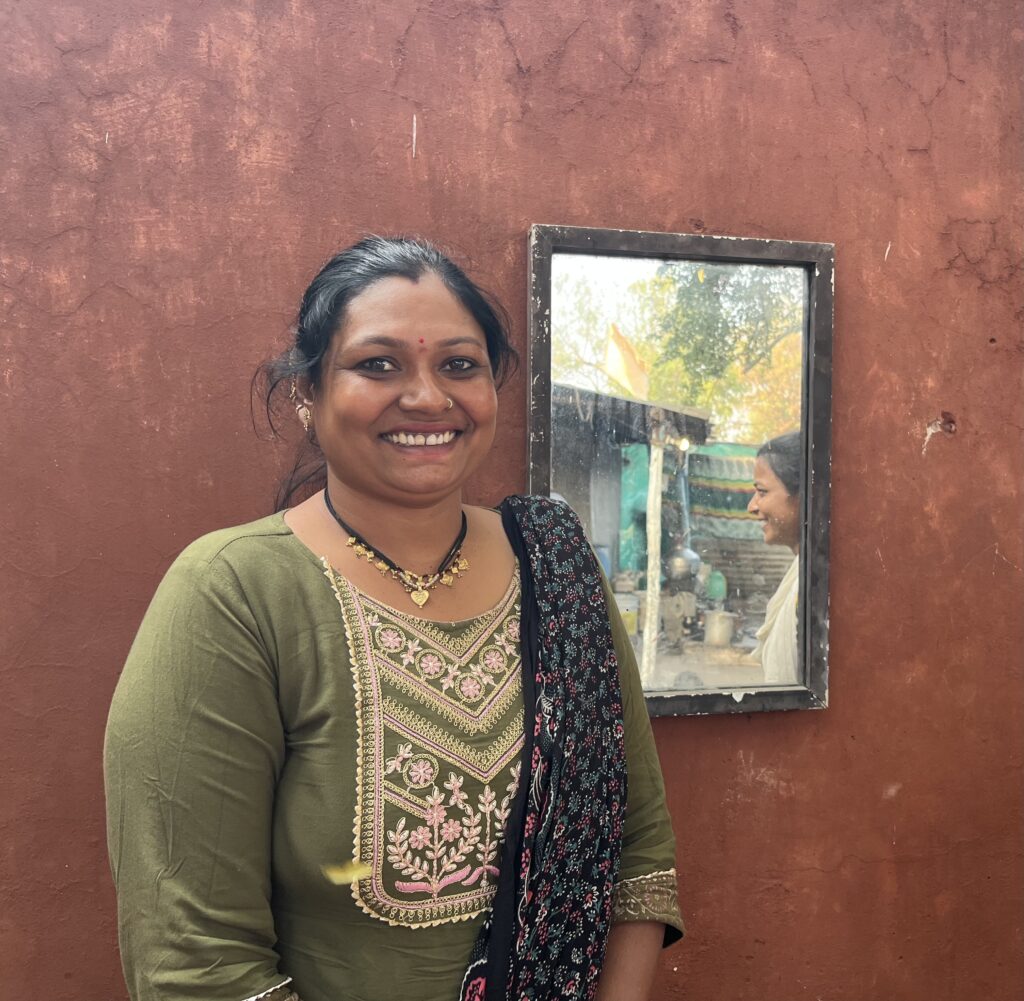
India’s national suicide prevenation strategy aims to reduce suicide mortality by 10% in the country by 2030. But there is no strategy that deals specifically with suicides among marginalised communities.
Sanish is a young Pardhi woman who runs Majal, an informal youth group in association with Muskan, in bastis. This group is the only resort for youth and women who wish to talk about their fears and anxieties and seek counselling or emergency support. The Pardhi women and men we interviewed were unaware of helplines like Tele-MANAS, a free nationwide mental health support service provided by the government.
(People who are in distress or have suicidal thoughts can seek help for free on Tele MANAS helpline with 14416 or 1-8008914416)
We believe everyone deserves equal access to accurate news. Support from our readers enables us to keep our journalism open and free for everyone, all over the world.
